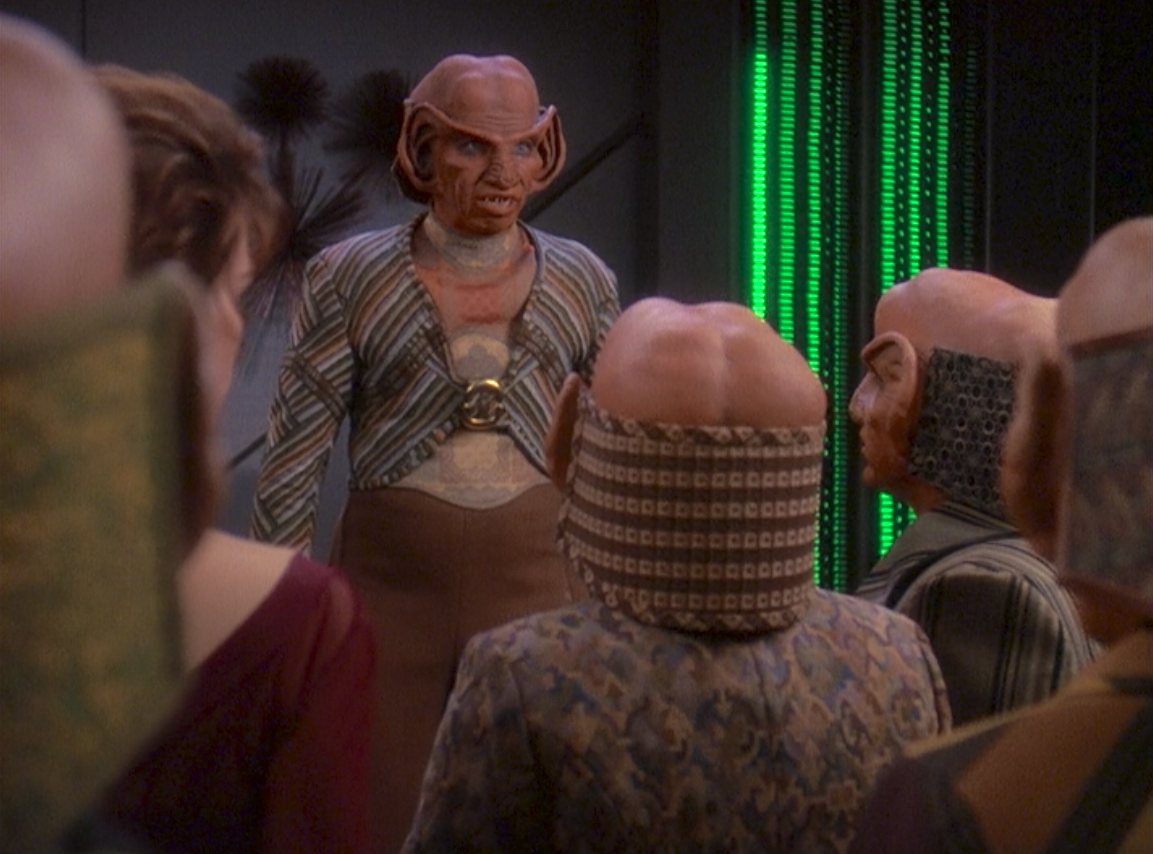5 things the ‘Star Trek: Deep Space Nine’ episode ‘Bar Association’ teaches us about striking
Rom addresses his colleauges in “Bar Association.” Paramount Domestic Television
The “Star Trek: Deep Space Nine” episode “Bar Association” follows a group of bar employees who unionize.
The episode, which first aired in 1996, depicts a fictional strike for better working conditions.
27 years later, it holds valuable lessons about standing in solidarity with your colleagues.
“Star Trek” has always been at the forefront of the most important social issues of the day. When the original series started in 1966, it was groundbreaking for portraying diverse cast members as equals, and it has continuously aimed to tackle timely (and timeless) issues.
In 1996, the series “Star Trek: Deep Space Nine” tackled an issue at the heart of the labor movement: unionization. The episode “Bar Association” focuses on the Ferengi character Rom starting a union with his coworkers at a bar his brother, Quark, owns on the titular station.
The Ferengi, a race of over-the-top capitalists who serve as a foil to the utopian Federation, have strict laws forbidding unions. Aboard DS9, however, their jurisdiction is limited, giving Rom and the others a chance to seize essential concessions from Quark. The episode’s story plays out over the course of days — a brisk pace that sees the union go on strike just moments after its members announce its formation — but it’s full of essential lessons for all workers.
1. Your boss thinks they know how you feel
At the start of the episode, Rom complains of ear pain, and Quark tells him he knows exactly how he feels. Station residents have access to free healthcare, but Rom has been so overworked at his job that he hasn’t had the time to seek the treatment he needs. When he collapses in pain, Quark says in a snide tone that he’s going to dock his pay.
Seems painful! Paramount Domestic Television
The truth is, of course, that Quark doesn’t really understand what Rom is going through. As his brother, he believes he fully gets Rom’s experience, but he can’t truly understand what it’s like to have to choose between his health and meeting his boss’s demands.
That’s not to say that Quark doesn’t experience hardship — later in the episode, a representative of the Ferengi Commerce Authority (FCA) beats him to send a message to Rom that his union activities won’t be tolerated, but it’s safe to assume that Quark doesn’t dock his own pay while he recovers in the infirmary.
2. Your boss expects you to bear the burden of any downturn
It’s a slow month at Quark’s Bar; many of the bar’s regular patrons are in the middle of a cleansing ceremony and abstaining from indulging at the bar. Feeling the diminished profits, Quark announces that he’s cutting everyone’s pay by a third, and that they should be happy — it’s that or a round of layoffs.
We later find out that the Federation has been waiving Quark’s rent and other expenses for years, so it’s questionable whether Quark has exigency to cut his employees’ pay. Regardless, his belief that his employees should be grateful to only receive a massive pay cut shows a cognitive bias that’s all too common: He completely fails to consider that his profits this month could simply be a bit lower, or that he could even weather the downturn and have to be financially responsible for keeping his company afloat.
3. It’s worth learning the history of the labor movement
While seeking advice from the station’s chief medical officer, Julian Bashir, Rom learns that the chief of operations, Miles O’Brien, is a descendant of a coal miner and union leader who went on strike in Pennsylvania in 1902. His ancestor was murdered, his body found riddled with bullets in a river just days before the end of the strike, but thanks to his tireless work and sacrifice, the workers had their demands met.
Bashir comments that he was a hero. “He was more than a hero,” O’Brien responds. “He was a union man.”
Learning the real history of the labor movement (and where we’re at now) is one of the best ways to build solidarity and feel encouraged that you can achieve the goals your union has set. Workers have been fighting for their rights for generations, and we’ve achieved so much already. We are still writing that history, and it’s incredibly reassuring to be able to learn from those who’ve come before.
4. When we fight, we win
Rom convinces his coworkers to form a union, and they present Quark a list of their demands: increased pay, shorter hours, and paid sick leave. When Quark tells them meeting their demands is impossible, Rom announces that they’re going on strike. The workers form a picket line at the entrance to the bar, encouraging people to support them by not patronizing it.
Bar employees hold the line outside of the establishment. Paramount Domestic Television
Of course, when he says it’s impossible, what he really means is that it’s inconvenient. An increasingly desperate Quark tries offering a bribe to Rom to end the strike. “There’s only one thing I have to say to you,” Rom says. “‘Workers of the world unite! You have nothing to lose but your chains.’”
Quark tries to keep the business afloat all on his own with hologram duplicates of himself (poorly) serving patrons, but eventually, he’s forced to capitulate. To save face with the FCA, the union officially disbands, but Quark quietly gives into all of his employees’ demands. Of course, disbanding is a pretty extreme concession that most unions are unlikely to ever actually take in reality, but it’s a valuable illustration of the fact that none of the workers’ economic demands were ever truly impossible.
5. You don’t need your boss — your boss needs you
The episode ends with Rom announcing that he’s quitting his job at the bar. He’s taken on another job on the station, and he tells Quark that he’s learned that he does a lot better on his own than he does with Quark. Throughout the episode, Quark repeatedly tries to convince Rom that he can’t handle this situation on his own and that he’s just looking out for him.
The truth is, though, that Rom is strong enough to stand up for himself and his fellow workers. He doesn’t need Quark’s support to accomplish any of what he does during the episode. Management wants you to believe that you need them to survive, but the truth is that they need you more — and you can do bigger and better things without them.
Business Outsider is a strike publication of Insider Union, which is a unit of The NewsGuild of New York.
Follow our Twitter for updates on the strike, and if you enjoyed this content and would like to throw in some cash for our members who are losing wages every day that we strike for a fair contract, feel free to visit our hardship fundraiser here. Want to help us tell the boss to reach a deal? Let Nich Carlson and Henry Blodget know you support us by sending a letter.



